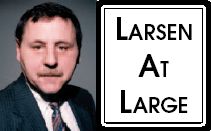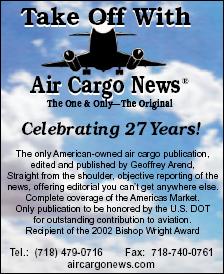|
You are currently
in the Archives section. Please be aware that some information and links
in the archived page may be outdated.
Click here
to return to the Archives' main page to see the list of archived articles.
|
A
R C H I V E S
LARSEN
AT LARGE
|

Air
Cargo News welcomes the voice of experience Jim Larsen to our editorial
team.
For the past decade as director of
cargo marketing for The Port Authority of New York & New Jersey,
Mr. Larsen has been among the select handful of airport and industry
cargo experts travelling the globe while attending important conferences,
seminars and government functions.
Prior to his service at America’s
most important air cargo gateway, Mr. Larsen served in management
positions in every aspect of air cargo for more than 40 years including
a stretch of service at air cargoís innovative and pioneering Seaboard
World Airlines.
“Jim Larsen At Large” will appear
as a regular feature of aircargonews.com and the monthly newspaper.
Feedback can be directed to Jim at
Larsen@jfkaircargo.com
|
On
March 27th the New York/New Jersey air cargo community once again gathered
at the Holiday Inn at JFK to show off their wares for the 3rd annual JFK
Air Cargo Expo which featured 42 exhibits ranging from automated manifest
systems to systems to transport zoo animals. In addition to the exhibition,
speakers and panelists came together to explore and discuss the past,
present and future of an industry particularly hard hit in the areas of
cargo security and economic survival.
An industry that possesses good solid experience
in the movement of air cargo and, one that desperately wants to work with
lawmakers before actions are taken that may affect its ability to maintain
the safe unrestricted movement of goods.
We in New York also face competition from
other U.S. gateways, as Mr. William DeCota, Director of Aviation for the
Port Authority of New York and New Jersey pointed out in his opening remarks
when he said: “There is competition today at many levels but competition
and rivalry are good—they are a test of skill that makes us better and
forces us to rethink products and services and maintain a customer-focused
edge.”
Continuing, he told the audience of the
importance he places on the community working with government agencies
on everything from access to security by highlighting the value of the
experience of the JFK air cargo community. “ In looking at the list of
attendees, something jumps out right away about the uniqueness of this
Air Cargo Association Expo. . . ITS UNIQUELY NEW YORK. We all do business
at John F. Kennedy International Airport. We are the leaders of a robust
regional air cargo community and, as such, we are leaders in the air cargo
industry. There is no other air cargo hub on the planet with the past,
present and future of JFK.”
Perhaps the New York air cargo community’s
concerns regarding government intervention was best voiced in a recent
speech given by Bill Graves, President and CEO of American Trucking Association
and former Governor of Kansas. In it he made an interesting comparison
on the way the private sector would tackle a problem and the way government
attacks the same problem.
He said, “My father used to tell me a
story about hauling livestock out of the hills of Central Kansas in the
1930’s. Contrary to popular belief, Kansas is not as flat as people think.
There are a lot of hills, and small watering ponds that attract cattle
in the low spots between those hills.
Back then, before the invention of the fuel
pump, a truck’s fuel was gravity-fed and the fuel tanks were generally
mounted up behind the driver’s seat. So it wasn’t a problem getting down
the hill, but if the hill was steep, the fuel stopped flowing to the engine
and you couldn’t get back up?
Later, working in government, I often thought
of how bureaucrats would have approached the problem: First, there’d have
to be a committee and certainly a bunch of studies by independent consulting
firms. Possible solutions - level off all the steep hills or prohibit
cattle pens from being built in the low spots.
What was my father’s non-government solution?
He’d load up the cattle; turn the truck around and back up the hill.”
Where experienced people can come up with
common-sense solutions that come from years of practical experience, the
members of the air cargo community feel they don’t need government to
micro-manage their business.
No one at the Expo advocated the abolition
of government but most feel if the government takes the time to listen,
perhaps we can show them the best way to get over the hills.
During the panel discussions it became evident
that there were also possibilities of the industry getting more out of
what they already have, by better training the people.
Panelists also examined ideas in the fields
of security and new technology, speaking of advances which will help the
community to ensure that, in the words of Secretary Mineta, “Our check
points do not become our choke points in air cargo movements.”
Still, the panel discussions left some underlying
concerns unanswered!
Liability casts a large shadow over our
industry today, especially in light of some tough economic times. How
the two will be blended together into some workable arrangements that
will not leave some small or mid sized freight forwarders liable for the
loss of an aircraft and possibly hundreds of lives is yet to be worked
out.
It can never be unless the industry keeps
going back to the rule makers insisting that, the same government that
rushed to create their own 50 thousand plus passenger security screening
force also take on the responsibility of certifying known shippers by
creating a TSA group to inspect and certify shippers facilities as well
as maintaining a database containing information on those shippers. At
present that responsibility has been left in the hands of the air carriers
and indirect air carriers. This has often been referred to as leaving
the fox in charge of the henhouse.
Finally the horrific events of September
11th and its aftermath pointed to complex challenges caused, at the time,
by the shutting down of major roadways and the airways.
Imagine if the next terrorist attack targets
the George Washington and Verrazano bridges!
What is the plan that will continue to supply
this region with the items necessary to maintain one’s existence, or does
it mean that everything and everyone east of the Hudson will be written
off?
From an access and a security standpoint,
the industry has to seriously look at transportation alternatives that
will allow the movement of goods in and out of the region, without placing
the entire burden on trucking alone. A region surrounded by water should
have a network of ferries capable of hauling trucks to and from points
on the mainland. If the former mayor determined that the city could run
the Staten Island ferries for free, why can’t the city or state at least
partially subsidize this type of transportation, allowing truckers access
to these rich markets without forcing them to run the gauntlet of the
already congested bridge, tunnel and roadway systems that feed the five
boros and Long Island.
As if security and access were not enough
in these difficult times, add to it one of the toughest economic downturns
air cargo has experienced in quite some time. Bankruptcies among some
of our major carriers, cutbacks in schedules, failures in the trucking
industry and labor issues on the west coast recently sent manufacturers
and retailers scrambling to find alternatives leaving manufacturers without
parts, and retailers without products, all of which resulted in making
what was expected to be a lean holiday season even leaner.
Unfortunately participants in the JFK Air
Cargo Expo alone cannot solve the economic problems the industry faces
but, on a daily basis, their efforts maintain this region’s reputation
as a leader in the movement of air cargo. It’s a tough business with a
lot of competition for a very limited amount of cargo.
The promotion of international cargo must
reach out to carriers’ overseas offices but those international carriers
are not having much of a problem either sales wise or operationally filling
their aircraft. It’s the backhaul that’s hurting.
It’s the people here at JFK and EWR who
are scrambling to fill the return legs of their international flights
with whatever cargo is out there with whatever the market will bear for
rates. It’s those people who sell these airports and their operational
capabilities and it’s those people we should thank for our success. That
thanks was evidenced by a proclamation from Helen Marshall, Borough President
of Queens declaring March 27th as Air Cargo day in Queens. The proclamation
was made by Mr. Seth Bornstein, a member of the Borough President’s staff
at the Expo Luncheon.
Congratulations air cargo. See you next
year!!
|

|


